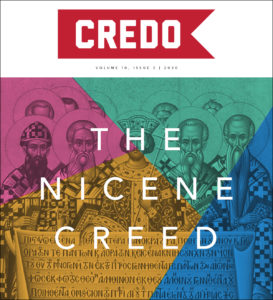Without a doubt, future generations will look back on this generation and say, they made the gospel of Jesus Christ central. As the last five decades reveal, from our book publications to our conferences, the gospel has taken center stage. I praise God for this emphasis on the gospel; it ensures the church rightly defines and prioritizes the saving work of Jesus Christ.
However, the history of the church reveals that with every good emphasis there is always the danger of overlooking or even disregarding other components of the Christian faith that are just as indispensable, perhaps even foundational. We are not immune to that danger just because we live in the present rather than past; in fact, our present existence might make us more susceptible still.
For example, today many labor to rightly preach about what God has done. But as for who God is…that is the stuff of speculation. What God does in history is Bible, but who God is in eternity is scholastic. Notice, this mindset can sound so Christian. In an effort to be gospel-centered, we might just forget who the gospel is all about: not us, but God. Captive to this mindset, who God is in and of himself—apart from this world—has nothing to do with my salvation; therefore, the deep things of God cannot be the focus or foundation of life in the church.In the mind of the Nicene fathers, eternal generation is the warp and woof of the Bible, a doctrine on which the entire story depends. Click To Tweet
But for most of history, this was not the Christian mindset. God was not a means to our ends; God was the end. Doctrine’s importance was not determined by relevancy. Contemplating who God is apart from us or what he might do for us was not only considered the first and greatest aspiration, but the greatest focus of Christian living, the very nucleus of corporate worship. Matters of salvation—God’s works in history—were considered central to the life of the church. However, there was a common understanding that the very foundation on which salvation stands is nothing less than the deep things of God.
For this reason, the Nicene Creed is not only invaluable but refreshing. Following the apostolic witness itself, the fathers understood that without a proper view of the eternal Son apart from creation, the church would forfeit a proper view of the Son’s saving work for creation. As the opening chapter of John’s Gospel demonstrates, the reason the Word can convey the saving message of the Father is only because he is the only begotten Son from the Father. Or as the Nicene Creed says, unless the Lord Jesus is “begotten from the Father before all time,” and unless he is begotten “of the same essence as the Father,” he cannot come “down from heaven” and become incarnate “for us men and because of our salvation.” In other words, unless he is begotten from the Father’s essence from all eternity, he cannot be sent by the Father to be born as a man in salvation history. Unless Jesus is the eternally begotten Son, he is not able or qualified to descend into the deep depths of this God-forsaken world, be born as a babe in a manger, and ascend back to his Father with a host of newborn sons in his wake.
In the mind of the Nicene fathers, eternal generation is the warp and woof of the Bible, a doctrine on which the entire story depends. As it turns out, if one reads Scripture how God intended—as an integrated whole rather than disparate parts, and with the triune God himself as its one, divine author who has revealed himself across the whole sweep of redemptive history—then eternal generation is seen for what it really is: the warp and woof of the Bible, a doctrine on which the entire story depends.
So yes, let’s be all about the gospel. Let’s even make it central. But let’s not forget, without eternal generation there is no gospel at all.


